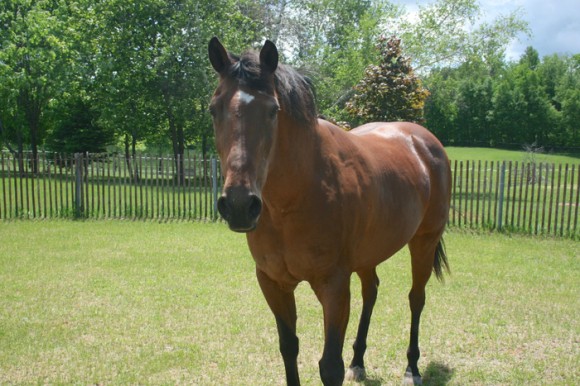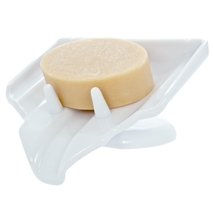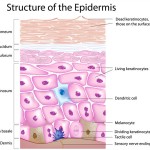 My view from my window has changed significantly.  While part of me is saddened, there is a part that is very happy.  For lots of different reasons, we have been considering finding a new home for my mare Fascination (Fasci) for some time. I was using her less and less, especially since our neighbors moved away and I no longer had my helpers come every morning to help me with chores. But I refused to part with her unless I could find her a good home and I did. A young girl contacted me and came to visit and she just fell in love with Fasci. She sends me pictures and tells me tales of their adventures together ( I never knew Fasci liked to swim!). It seems like they have both found their best friend and I think Fasci is happier with all the attention and spoiling, that only a young girl knows how to do. Her new owner is better than I had hoped and this story definitely has a happy ending.
My view from my window has changed significantly.  While part of me is saddened, there is a part that is very happy.  For lots of different reasons, we have been considering finding a new home for my mare Fascination (Fasci) for some time. I was using her less and less, especially since our neighbors moved away and I no longer had my helpers come every morning to help me with chores. But I refused to part with her unless I could find her a good home and I did. A young girl contacted me and came to visit and she just fell in love with Fasci. She sends me pictures and tells me tales of their adventures together ( I never knew Fasci liked to swim!). It seems like they have both found their best friend and I think Fasci is happier with all the attention and spoiling, that only a young girl knows how to do. Her new owner is better than I had hoped and this story definitely has a happy ending.
Spotlight
31
Jul 14
View From My Window – August 2014
29
Jul 14
Psoriasis Awareness Month

August is Psoriasis Awareness Month.  Many people find Alabu Skin Care because they are having problems with their skin. One of those problems is psoriasis; an autoimmune disease that causes inflammation and typically appears as scaly patches that are red and raised. Psoriasis is can be mild or a very severe disease. Non medical  approaches like diet changes, reducing stress, using a moisturizing soap, keeping moisturizers on your skin and avoiding hot showers can help the condition, but it is often not enough. There are five different types of psoriasis which makes it difficult to self diagnose. If you suspect you have psoriasis you should check out the National Psoriasis Foundation.  They have mountains of information to help.
28
May 14
Soap Saving Tips
 Handcrafted soaps are not drying like commercial soaps and are worth the extra cost to keep your skin soft, smooth and irritation free. Handcrafted soaps retain the natural glycerin in the soap, it helps keep the moisture in your skin. But it also can make your soap soft and it will get used up more quickly.
Handcrafted soaps are not drying like commercial soaps and are worth the extra cost to keep your skin soft, smooth and irritation free. Handcrafted soaps retain the natural glycerin in the soap, it helps keep the moisture in your skin. But it also can make your soap soft and it will get used up more quickly.
Here are some Soap Saving Tips to make your handcrafted soaps last longer.
1. Soap Savers, these come in many styles. The idea is to keep your soap dry in between use, keeping them dryer keep the bar harder and it will last longer. We have a small plastic soap saver. I know they are not “All Natural” but they clean up nice and last forever. We also have a nice cedar soap deck for those who prefer a natural way to keep your soap dry in between use. We even have one that helps keep your sink clean, the Waterfall soap dish.
2. Place your soap in the shower where the spray doesn’t hit it directly.
3. Some people go the extra step of alternating bars in the shower, so the bars have extra time to dry out in between use. I have a basket of soaps that I sometimes use for this.
4. When your soap ends too small to handle, wet and stick it to your new bar. The smaller the used bar the easier it is to stick to the new bar.
21
Nov 13
Your Skin: Absorption
 You have probably heard that your skin is the largest organ in your body and that it is a semi permeable membrane. But that doesn’t mean that anything you put on your skin goes right through it.  It is actually pretty hard for most substances to be absorbed through your skin. Pharmaceutical companies spend lots of money on research to try to make transdermal patches to deliver medicine, but there are very few on the market. Absorption through the skin is influenced by the size of the molecules of the substance, the concentration applied, how long it stays on your skin, other ingredients that can be added to aid absorption, the region of the body where it is applied, the condition of the skin, age, gender and race.
You have probably heard that your skin is the largest organ in your body and that it is a semi permeable membrane. But that doesn’t mean that anything you put on your skin goes right through it.  It is actually pretty hard for most substances to be absorbed through your skin. Pharmaceutical companies spend lots of money on research to try to make transdermal patches to deliver medicine, but there are very few on the market. Absorption through the skin is influenced by the size of the molecules of the substance, the concentration applied, how long it stays on your skin, other ingredients that can be added to aid absorption, the region of the body where it is applied, the condition of the skin, age, gender and race.
Your skin is made up of four layers and is about 0.05 inches thick or should I say thin?  The deepest layer (Basale layer) is where skin cells are made and they gradual migrate to the outermost layer called the Stratum Corneum). In between are the Stratum Granlosum and Stratum Spinosum. The Stratum Corneum is what you see when you look at your skin. What you actually see is tough, hard, dead skin cells (called corneocytes), which form a protective barrier, something like a brick wall. This protective layer is not only responsible for protecting against pathogens it also helps regulate temperature, maintains hydration and prevents water loss. These cells are surrounded by a natural oil layer called lipids, sort of like the mortar in the brick wall.  The corneocytes cells don’t have a blood supply and are held together by proteins. These proteins disintegrate over time and release the dead skin cells, exposing and replaced by the cells underneath. When these cells fall off irregularly it can create something like mountains and valleys, leaving your skin feeling rough and patchy. You can help to alleviate this feeling by applying creams or butters that fill in the gaps left between the intact cells.
This shedding of dead skin cells happens naturally but can become a problem when the natural skin oils are depleted through the use of harsh skin care products, too much exfoliation, ultraviolet radiation, climate changes, dehydration and hormonal levels. Disruption in this layer can make it more permeable to pathogens, allergens and dehydration and cause a variety of skin problems.
23
Oct 13
Seasons of Your Skin- 6 Tips for Autumn Skin Care
 The variation in the seasons changes your skin care needs. As we fall into autumn, (I know – bad pun) the air outside is getting unkinder and drier. Â As we start turning the heat inside, that dries out the inside air. You can see and feel your skin is becoming drier. The dry air inside and outside is a double whammy for your skin. But what can you do? Here are some skin care tips to help keep you comfortable in your skin.
The variation in the seasons changes your skin care needs. As we fall into autumn, (I know – bad pun) the air outside is getting unkinder and drier. Â As we start turning the heat inside, that dries out the inside air. You can see and feel your skin is becoming drier. The dry air inside and outside is a double whammy for your skin. But what can you do? Here are some skin care tips to help keep you comfortable in your skin.
- Keep hydrated. One of the most important things you can do for you skin is to drink water. People think they only need to drink a lot in the summer, but the truth is you need to stay hydrated all year long.
- If you like hot showers; Stop it! Hot water takes all the naturally occurring protective oils off your skin and dries it our even more. Take shorter warm showers instead.
- When it is cold outside, bundle up to protect your skin. Cotton is best next to your skin to avoid unnecessary irritation.
- Switch to a moisturizing soap. Most soap you buy in the store is very drying. I never realized this until I started making my own goat milk soap. I grew up with Ivory and Dial and didn’t know my skin wasn’t supposed to feel like it shrank after a shower. Hand made soaps are better than commercial soaps, but I think it is hard to beat Alabu goat milk soap. Our Baby Me soap is especially moisturizing. I actually formulated it for babies but it is our most popular soap now.
- Moisturize morning and night. In the morning it will provide a protective barrier to reduce evaporation. Moisturizing at night is most effective when done right after your shower or bath when your skin is clean and still moist.
- Switch to a heavier moisturizer in the fall or if your skin tends to be very dry. A nutrient oil based moisturizer with beeswax, like Alabu’s Shea Body Butter is especially helpful to protect against moisture loss through your skin.